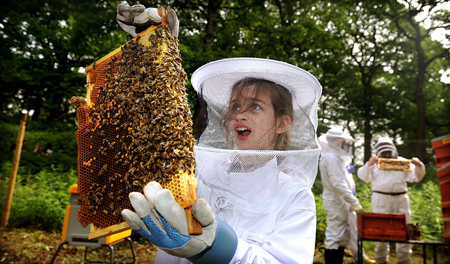School children from across Merseyside will help design the project
A three year experiment aimed at slowing honey bee decline, and interesting children in science, opened at Knowsley Safari Park with the help of University of Liverpool academics.
Dr Stewart Plaistow, Dr Chris Lowe and Dr Phil Watts, from the Institute of Integrative Biology, supported and co-wrote an application for a Royal Society grant lodged by teacher, John Moran of St Mary’s Preparatory School in Blundellsands.
Honey bees play an integral role in the natural world by acting as a cross-pollinator. It is estimated they are worth around £1bn to UK agriculture alone.
The experiment is seeking to determine whether a new, more flexible, form of bee hive, made from plastic and known as the Beehaus, can be just as effective as the traditional model.
Educate and inform
Teacher, John Moran said: “The other motivation is to educate and inform both children and adults about the importance of the honey bee. We want to provide an opportunity for children to construct and form their own questions for investigation and extend their understanding of data handling, as well as engaging the children in an investigation of scientific merit and helping them understand the contribution their findings may make.”
The launch of the project followed 12 months of planning and a £3,000 Royal Society grant, alongside a £10,000 environmental grant from HSBC Bank.
Dr Stewart Plaistow, lecturer in Evolutionary Biology, said: “One way we can influence the decline of the honeybee is by encouraging more people to keep bees, but it’s important we do this in the right way. The aim here is to compare the performance, health and ease with which bees can be kept, using either a traditional hive or the modern plastic beehaus. Anything we find will be useful feedback for both beekeepers and scientists working on honeybee decline
Bringing science to life
“It’s also important that kids start to understand how you go about asking scientific questions. They get time to interact with people who work in science and it may encourage them to think about it as a future career. The kids themselves are going to help design the project so it is a learning experience for them. If they want to know which hive is the best they will have to come up with ways of measuring that.”
A total of 20 hives will be assessed, with ten at Knowsley Safari Park and ten at Queensway Allotments in Crosby.
John Moran added: “We hope to bring science to life in a very distinctive way by giving children the chance to make a real difference through their own actions and understanding. The partnerships developed between teachers and scientists will be ground breaking for the schools, offering a new perspective, sharing skills and science which we might not have been able to access otherwise.”
